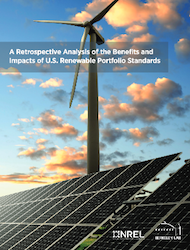In 2013, there were $2.2 billion in benefits from reduced greenhouse gas emissions and $5.2 billion came from reductions in other air pollution for states with renewable portfolio standards (RFS) according to a new study. “A Retrospective Analysis of the Benefits and Impacts of U.S. Renewable Portfolio Standards,” evaluates the benefits and other impacts of RPS policies and was conduced by researchers from U.S. Department of Energy’s Lawrence Berkeley National Laboratory (Berkeley Lab) and National Renewable Energy Laboratory (NREL).
 RPS policies require utilities or other electricity providers to meet a minimum portion of their energy output with eligible forms of renewable electricity such as wind and solar power. The report finds there are 29 U.S. states plus Washington, D.C., with RPS policies in place and they have been a driver for renewable electricity generation in the U.S. over the past decade. Many states are currently considering whether to extend, eliminate, or otherwise revise existing RPS policies and the goal of the report is to help officials evaluate their programs.
RPS policies require utilities or other electricity providers to meet a minimum portion of their energy output with eligible forms of renewable electricity such as wind and solar power. The report finds there are 29 U.S. states plus Washington, D.C., with RPS policies in place and they have been a driver for renewable electricity generation in the U.S. over the past decade. Many states are currently considering whether to extend, eliminate, or otherwise revise existing RPS policies and the goal of the report is to help officials evaluate their programs.
“Our goal was to estimate the magnitude of RPS benefits and impacts at a national-level, using established methodologies, while recognizing that individual states can perform their own, more-detailed assessments,” said NREL’s Jenny Heeter one of the report’s authors.
In addition to evaluating environmental benefits, the study also assessed other impacts. The research estimates that RPS policies supported 200,000 renewable energy-related jobs in 2013, saved consumers up to $1.2 billion from reduced wholesale electricity prices and another $1.3 to $3.7 billion from reduced natural gas prices.
This work was a follow-up and complement to an earlier study by the two labs that focused on the costs of state RPS programs to-date and that noted the need for a full understanding of the potential benefits, impacts, and costs of RPS programs. To that end, this most recent study provides a point of comparison for estimates of RPS program costs. The researchers are planning a follow-up effort for the coming year to evaluate the costs and benefits of RPS programs prospectively, considering scheduled increases to each state’s requirements as well as potential policy revisions.

